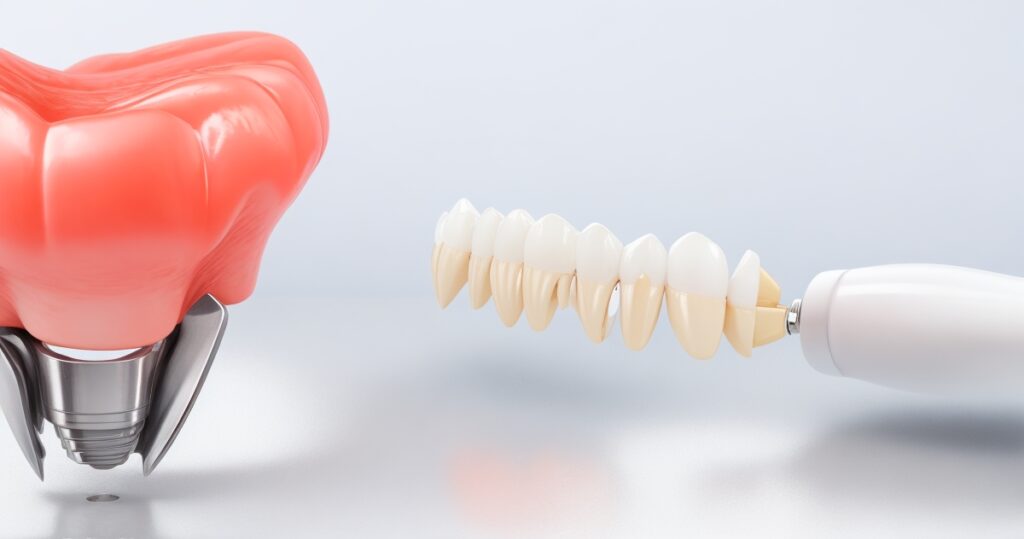The cost of dental procedures can be a significant concern for individuals seeking to restore their oral health and smile. Among these procedures, the question often arises: “How much does it cost to implant a tooth?” Dental implants have become a popular and effective solution for replacing missing teeth, but their pricing can vary depending on several factors. In this discussion, we will delve into the various aspects that influence the cost of implanting a tooth and provide insight into what you can expect when considering this dental restoration option.
The Importance of Dental Implants
Dental implants are more than just prosthetic teeth; they are the key to regaining not only your smile but also your quality of life. These remarkable fixtures offer a permanent and highly effective solution for replacing missing teeth, giving you the confidence to eat, speak, and socialize without reservations. Beyond aesthetics, dental implants play a pivotal role in preserving the integrity of your jawbone. When a tooth is lost, the surrounding bone begins to deteriorate, but implants act as artificial tooth roots, stimulating bone growth and ensuring long-term oral health.
Dental implants provide stability and support to neighboring teeth, preventing misalignment and bite issues. They offer unmatched durability and comfort, becoming a seamless part of your mouth. Understanding the significance of dental implants is crucial for anyone considering tooth replacement options, as it underlines their role in enhancing overall well-being.
The Cost Consideration
While dental implants offer an array of benefits, the decision to undergo the procedure is often met with the question of cost. Implant costs can vary significantly based on several factors, including the number of implants required, the location of the tooth, and any Procedures such as bone grafting or sinus lifts. The type of implant material, whether titanium or zirconia, also influences the overall expense.
It’s essential to be informed about the various cost components, including consultation fees, imaging, surgeon’s fees, and the cost of abutments and crowns. Factors such as the expertise of the dentist, the need for anesthesia, and the geographical location can also affect the final bill. This article delves deep into the intricacies of dental implant costs, shedding light on the essential details to help you make a well-informed decision regarding your oral health and financial investment.
Factors Influencing the Investment

Tailoring the Number of Implants
1. Singular Grace vs. Multiplicity of Replacement
The quantity of dental implants required gracefully guides the cost consideration. A singular implant, graciously restoring a lone missing tooth, naturally bears a lighter financial burden compared to the artful placement of multiple implants for several missing companions. The intricacy of the procedure and the choice of materials graciously shape the overall investment.
The Position of the Tooth
1. Frontal Elegance vs. Molar Serenity
The placement of the tooth within the sanctuary of your oral haven gracefully dances with cost variances. The meticulous aesthetic contemplation demanded in replacing a missing front tooth, a true showcase of your smile’s elegance, might entice the use of more specialized materials and techniques, thus potentially elevating the cost. Meanwhile, the serene molars, although essential for your culinary pleasures, may present a more affordable canvas for restoration due to their unobtrusive disposition.
Pre-Implant Preparations
1. The Artistry of Bone Grafting
2. The Elevation of Sinus Lift
The pre-implant artistry that is bone grafting and the gentle elevation of a sinus lift are at times essential to ensure the stability and success of the implant. Bone grafting performs the noble task of fortifying the jawbone, providing a resolute foundation for the implant. Conversely, a sinus lift becomes an imperative when the sinuses gently encroach upon the site of the implant. These procedures tenderly add to the overall cost and duration of the implant journey.
The Materials We Embrace
1. Titanium’s Timeless Elegance vs. Zirconia’s Aesthetic Grandeur
The choice between the timeless elegance of titanium and the aesthetic grandeur of zirconia implants bestows an elegant touch to the cost landscape. Titanium, known for its classical appeal, offers a more affordable option, while zirconia, with its tooth-colored allure, opens a path to a more artful alternative. Grasping the differences and the associated costs of these materials is essential when weaving the tapestry of your implant decision.
The Gentle Embrace of Anesthesia and Sedation
The gentle embrace of anesthesia and sedation is pivotal in ensuring your serene comfort throughout the implant procedure. The type and depth of anesthesia chosen, whether local or general, and the range of sedation options, compose the cost’s gentle nuances.
The Dentist’s Adept Touch
The experienced and artful touch of the dentist too graces the cost considerations. Accomplished implant specialists may humbly request a higher fee for their services, a reflection of their refined artistry and finesse. Their expertise often guides the procedure with grace, reducing the potential for complications and risks, rendering their services a treasured investment in the path to lasting dental harmony. The essence of these factors gracefully shapes the understanding of dental implant costs.
Cost Breakdown

Consultation and Examination Fees
The initial consultation and examination with your implant specialist are the first steps in determining your treatment plan. During this phase, the dentist will assess your oral health and discuss your implant options. While this consultation is typically a necessary expense, some clinics offer complimentary initial consultations.
Imaging and Diagnostic Tests
Before the implant procedure, various imaging and diagnostic tests are performed to ensure precision and effectiveness. These may include X-rays, CT scans, and 3D imaging. Understanding the costs associated with these diagnostic tests is essential to avoid surprises in your bill.
Implant Surgery Costs
1. Surgeon’s Fees
The surgeon’s fees encompass the cost of the implant procedure itself. The surgeon’s expertise and experience can significantly impact these costs. While experienced surgeons may charge more, their proficiency often leads to smoother procedures with reduced risks.
2. Operating Room Fees
The implant procedure may be conducted in an operating room, particularly for more complex cases. Operating room fees include the cost of maintaining a sterile and safe environment for the surgery, as well as the use of specialized equipment.
Additional Procedures
In some cases, Procedures like bone grafting, sinus lifts, or extractions are required to prepare the implant site. These supplementary procedures add to the overall cost but are crucial for the success of the implant.
Cost of the Implant Material
The implant material itself, whether titanium or zirconia, constitutes a significant portion of the cost. Understanding the differences in material quality and costs can help you make an informed choice.
Abutment and Crown Costs
The abutment and crown are essential components that sit atop the implant, completing the restoration. The cost of these elements varies depending on the material used and the complexity of the restoration.
Anesthesia and Medication Expenses
Anesthesia and medication are administered to ensure patient comfort during the procedure and facilitate post-operative healing. These expenses may vary based on the type of anesthesia used and any specific medication requirements. Being aware of these costs is crucial for budgeting your dental implant procedure effectively.
Location Matters
Regional Cost Variations
The geographical location in which you seek dental implant treatment significantly impacts the overall cost. Regional cost variations are a direct reflection of economic factors, supply and demand dynamics, and the cost of living within a particular area. Urban centers, for instance, often command higher prices due to increased overhead costs, such as rent, labor, and facility maintenance.
In regions with a high cost of living, the expenses associated with dental implants may be notably elevated. Conversely, areas with a lower cost of living generally offer more cost-effective options for patients. Understanding these regional disparities is vital for those seeking dental implant procedures, as it allows for better financial planning.
Rural vs. Urban Pricing
Rural and urban areas present distinct price landscapes for dental implants. In urban settings, the proximity to a larger population often leads to a higher concentration of dental specialists and clinics. This increased competition can sometimes drive prices down as providers vie for patients. However, the overall cost may still be influenced by higher overhead expenses.
On the other hand, rural areas may have fewer implant specialists, resulting in less competition. While this may lead to slightly higher prices, it can also be advantageous in terms of personalized care and attention. Travel costs and convenience factors should also be considered when deciding between rural and urban settings for your dental implant journey.
Ultimately, the choice between rural and urban pricing should align with your budget, convenience, and the level of personalized care you desire. Weighing these factors is essential in making an informed decision about where to embark on your dental implant experience.

Dental Insurance and Coverage
Dental Insurance Options
When considering dental implant procedures, it’s essential to explore your dental insurance options. Dental insurance typically falls into two categories: traditional dental insurance and dental discount plans. Traditional insurance may cover a portion of your implant expenses, while discount plans offer reduced fees for services in exchange for a membership fee.
Traditional dental insurance plans often have annual limits and may not fully cover implant procedures. It’s crucial to understand your policy’s specifics, including waiting periods and exclusions. Some plans may cover routine dental care but exclude dental implants, which are often considered elective or cosmetic procedures.
Dental discount plans, in contrast, provide reduced fees for a wide range of dental services, including implants. These plans have no annual limits, waiting periods, or exclusions and can offer more flexibility and savings for those seeking implant treatments.
Coverage for Implant Procedures
Dental insurance coverage for implant procedures varies significantly from one plan to another. Many insurance plans classify dental implants as a cosmetic procedure and may not provide comprehensive coverage. However, some policies may offer partial coverage for implant-related costs, such as diagnostic tests or crowns.
Patients should consult their insurance providers to determine the extent of coverage available. Some employers offer supplementary dental insurance plans that may cover a higher percentage of implant expenses. Understanding your coverage and potential out-of-pocket costs is crucial for budgeting your dental implant journey.
Financing and Payment Plans
To make dental implants more accessible, many dental clinics offer financing and payment plans. These options allow patients to spread the cost of their implant procedure over a manageable period. Patients can choose between low-interest loans, credit options, or in-house payment plans provided by the dental practice.
Third-party financing companies specialize in medical and dental procedures and offer flexible repayment terms. Understanding the financing options available can help individuals proceed with their implant treatment without the immediate financial burden.
Overall, exploring dental insurance, understanding coverage, and considering financing options are pivotal steps in making dental implants an affordable and feasible option for achieving a healthy and radiant smile.
Alternative Options

Dental Bridges
Dental bridges offer a time-tested alternative to dental implants for replacing missing teeth. These fixed prosthetic devices consist of pontics (artificial teeth) anchored in place by dental crowns. Bridges effectively bridge the gap created by missing teeth, restoring your ability to chew and speak with confidence.
Dental bridges are known for their relative affordability and can be an attractive option for individuals looking to restore their smile without the cost of implants. The procedure involves preparing adjacent teeth for crowns, which act as anchor points for the bridge. While bridges can be a durable solution, they require the alteration of healthy teeth, potentially compromising their integrity over time.
Dentures
Dentures have long been a reliable and cost-effective solution for replacing missing teeth. These removable prosthetic devices come in partial or complete sets, tailored to your specific needs. Dentures provide the advantage of easy maintenance and affordability, making them a popular choice for many.
Partial dentures are used when some natural teeth remain, while complete dentures replace all teeth in the upper or lower jaw. However, dentures may require regular adjustments due to changes in the jawbone’s shape, and some individuals may find them less stable compared to dental implants.
Pros and Cons Comparison
When weighing the alternatives of dental bridges, dentures, and dental implants, it’s crucial to consider the pros and cons of each option. Dental bridges and dentures are generally more cost-effective upfront and require less invasive procedures. However, they may not provide the same level of stability, comfort, and long-term benefits that dental implants offer.
Dental implants stand out for their natural look and feel, durability, and ability to preserve jawbone health. They do, however, involve a more intricate and costly procedure. Understanding the nuances of these alternatives, and their impact on your oral health and daily life, is key to making an informed decision that aligns with your needs and budget. Each option has its own charm and considerations, and your choice ultimately depends on your unique circumstances and priorities.
Affordable Implant Solutions
Dental Schools
Dental schools offer an unconventional yet cost-effective path to dental implant treatment. These educational institutions often have clinics where senior dental students, under the guidance of experienced instructors, perform procedures at reduced rates. While the treatment may take longer due to the learning process, it’s carried out under strict supervision to ensure quality care.
Choosing a dental school for your implant procedure can result in substantial cost savings without compromising the quality of care. It’s important to research local dental schools, review their patient requirements, and inquire about their implant programs to determine if this option aligns with your budget and time frame.
Dental Tourism
Dental tourism has become an increasingly popular option for those seeking affordable dental implant solutions. It involves traveling to countries where the cost of dental care is considerably lower than in your home country. These destinations often boast modern, well-equipped dental facilities staffed with skilled professionals.
While dental tourism offers the potential for significant cost savings, it does come with logistical challenges and considerations, such as travel expenses and language barriers. It’s vital to thoroughly research and plan your dental journey abroad, including verifying the qualifications of the dental clinic and ensuring your travel arrangements align with the treatment schedule.
Dental Discount Plans
Dental discount plans, also known as dental savings plans, provide a straightforward and budget-friendly way to access dental care, including implant procedures, at reduced rates. Unlike traditional insurance, these plans involve a straightforward membership fee, granting you access to a network of dental providers who offer services at a discount.
Dental discount plans have no annual limits, waiting periods, or exclusions, making them a flexible and cost-effective option for individuals seeking affordable dental implants. These plans can complement traditional insurance or serve as a standalone solution for those without insurance coverage.
Exploring these affordable implant solutions, whether through dental schools, dental tourism, or dental discount plans, can help individuals navigate the financial aspects of dental implant treatment while receiving quality care and preserving their oral health. Each option offers its unique advantages, making it important to choose the one that best suits your needs and preferences.
Long-Term Advantages
Prolonged Life of Dental Implants
Dental implants present an exceptional and enduring answer to the need for tooth replacement. Their enduring nature speaks to their sturdy design and use of biocompatible materials. With the right care and maintenance, dental implants have the potential to serve you for a lifetime. Unlike other alternatives that may necessitate periodic replacement, dental implants become a permanent and sound investment in your oral health.
The remarkable longevity of dental implants is supported by their unique capacity to merge seamlessly with the jawbone, a process known as osseointegration. Beyond providing stability, this fusion prevents bone loss, ensuring the preservation of your facial structure over the years. By embracing regular oral hygiene practices and keeping up with dental check-ups, you ensure that your implants remain a steadfast and integral part of your radiant smile for decades to come.
Enhancements to Oral Well-being
Beyond their cosmetic allure, dental implants make significant contributions to overall oral well-being. Upon tooth loss, the surrounding bone faces the risk of deterioration. Dental implants, serving as artificial tooth roots, actively stimulate bone growth and safeguard the integrity of your jawbone. This preservation guarantees that adjacent teeth maintain proper alignment, effectively reducing the risk of misalignment and bite irregularities.
Implants elevate oral functionality, allowing you to bite, chew, and speak with confidence as if you possessed your natural teeth. Remarkably, they are impervious to cavities. Nevertheless, regular oral hygiene practices remain imperative for the upkeep of healthy gum tissue. The enduring improvements in oral health attributed to dental implants extend well beyond their aesthetic appeal.
Aesthetic Elegance and Renewed Confidence
Dental implants bestow a profound gift of aesthetic elegance and newfound self-confidence. Painstakingly designed to replicate natural teeth in both form and function, they deliver a seamless and lifelike smile. With implants in place, you are free from concerns about gaps or removable appliances. The aesthetics of dental implants wield a transformative influence over your self-esteem, empowering you to smile, laugh, and converse without reservation.
This renewed self-assuredness can impart a positive impact on various facets of your life, from nurturing personal relationships to seizing professional opportunities. The knowledge that your smile radiates beauty and your teeth stand secure can be a life-altering experience. Thus, dental implants, beyond serving as a pragmatic investment in your oral health, evolve into a profound enhancement of your overall well-being. The long-term rewards of dental implants encapsulate health, aesthetics, and newfound self-assurance, rendering them a holistic solution for the replacement of missing teeth.
Risks and Complications
Potential Risks
Before embarking on the journey of dental implantation, it’s essential to be well-informed about the potential risks and complications that may arise. While dental implants are generally safe and successful, like any medical procedure, they do carry some inherent risks. These include infection, implant failure, nerve or tissue damage, and complications associated with anesthesia.
Infection is a primary concern, and it may occur during or after the surgery if proper oral hygiene is not maintained. Implant failure can result from factors such as poor osseointegration, inadequate bone support, or incorrect implant placement. Nerve or tissue damage, although rare, can cause numbness or tingling in the surrounding areas.
Being aware of these potential risks is crucial, as it allows for informed decision-making and diligent post-operative care to minimize these risks.
Managing Complications
When considering dental implants, it’s also important to understand how complications can be managed. Fortunately, most complications are treatable, and the success of dental implants is often restored through timely intervention.
In the event of infection, prompt treatment with antibiotics can effectively resolve the issue. Implant failure can sometimes be mitigated by replacing the implant or making necessary adjustments to ensure proper osseointegration. Nerve or tissue damage, though uncommon, may improve with time, or surgical intervention may be required in severe cases.
The management of complications underscores the importance of choosing a skilled and experienced implant specialist. They have the expertise to detect and address potential issues early, reducing the likelihood of complications and ensuring the best possible outcome.
While understanding the potential risks and complications may initially seem daunting, it’s important to remember that dental implants remain a highly successful and transformative treatment option. With thorough assessment, meticulous planning, and proper aftercare, the vast majority of patients experience the life-changing benefits of dental implants with minimal complications.
Post-Operative Care
The Healing Process
The post-operative phase of dental implant treatment is a crucial part of your journey to a restored smile. Understanding the healing process is paramount to ensure a successful outcome. Following the surgical placement of dental implants, your body initiates the natural healing process.
In the days and weeks following the procedure, you may experience some mild discomfort, swelling, and bruising. This is entirely normal and can be managed with pain medication and cold compresses. As your body heals, the implants gradually bond with the jawbone through osseointegration. This is a gradual process that can take several months, but it’s essential for the implants’ stability.
Post-operative care also involves maintaining a soft diet to avoid putting excessive pressure on the implants during the initial healing period. Your dentist will provide guidance on oral hygiene practices and any specific aftercare instructions to follow. Regular check-ups with your implant specialist will allow them to monitor your progress and address any concerns that may arise during the healing process.
Post-Operative Appointments
Post-operative appointments play a vital role in ensuring the long-term success of your dental implants. These appointments are typically scheduled at various intervals after the initial surgery. During these visits, your dentist will assess the healing of the implant sites, monitor osseointegration progress, and make any necessary adjustments to your treatment plan.
These appointments also provide an opportunity to address any concerns or discomfort you may be experiencing. Your dentist will offer guidance on oral hygiene and discuss the transition to a regular diet. It’s essential to attend these appointments as they enable your dentist to identify and address any potential issues early, increasing the likelihood of a successful and lasting outcome for your dental implants.
By actively participating in post-operative care and attending your scheduled appointments, you contribute to the overall success and longevity of your dental implants, ensuring a radiant and functional smile for years to come.
Maintaining Dental Implants Of How Much Does It Cost To Implant A Tooth?
Oral Hygiene Practices
Once you’ve embarked on the journey of dental implants, it’s essential to prioritize meticulous oral hygiene practices to ensure the long-term success of your investment. Dental implants, like natural teeth, require proper care to remain healthy and functional.
Regular brushing and flossing are paramount for maintaining oral hygiene. Using a soft-bristle toothbrush and non-abrasive toothpaste, you should gently clean around the implant sites. Specialized interdental brushes or water flossers can be beneficial for reaching areas that are challenging to access with traditional floss.
Antibacterial mouthwash can also aid in preventing infection and gum disease. As with natural teeth, it’s important to avoid abrasive or highly acidic oral hygiene products that could damage the implant or surrounding tissue.
Regular Dental Checkups
Routine dental checkups are a cornerstone of maintaining the health of your dental implants. Your dentist will schedule regular follow-up appointments to assess the condition of your implants and ensure they remain in optimal shape.
During these checkups, your dentist will examine the implant sites, assess the integrity of the crowns or prosthetic components, and perform any necessary professional cleanings. These visits provide a valuable opportunity for your dentist to detect any potential issues early and take preventive measures, ensuring the longevity of your dental implants.
Your dentist may also provide guidance on diet and lifestyle habits that can contribute to the preservation of your dental implants. By adhering to a consistent regimen of oral hygiene practices and attending regular checkups, you can enjoy the lasting benefits of dental implants and maintain a healthy, radiant smile.
Patient Testimonials
Real-Life Experiences
Real-life experiences shared by patients who have undergone dental implant procedures provide invaluable insights into the transformative power of this treatment. Hearing directly from those who have chosen dental implants can offer a unique perspective and inspiration for individuals considering this journey.
These testimonials often recount personal challenges related to missing teeth, such as difficulty eating, speaking, or a diminished self-esteem due to gaps in their smiles. Patients frequently describe how dental implants have restored their ability to live life to the fullest, eat their favorite foods, and speak with confidence. These firsthand accounts help prospective patients understand the real impact of dental implants on daily life.
Success Stories
Success stories within the realm of dental implants illuminate the remarkable potential of this treatment. These stories often feature individuals who have overcome substantial dental challenges, such as extensive tooth loss, and found renewed hope and confidence through dental implants.
Success stories typically cover the entire journey, from the initial consultation to the post-operative phase, and highlight the comprehensive transformation experienced by the patient. These narratives often emphasize the enhanced oral function, aesthetics, and self-esteem that dental implants bring.
Success stories can be a source of motivation and reassurance for those considering dental implants, offering a vivid picture of the life-changing benefits that await them. Hearing how others have regained their smiles and transformed their lives can provide valuable encouragement and affirmation for individuals embarking on their own dental implant journey.
Conclusion
The cost of implanting a tooth can vary significantly depending on various factors, including the number of implants needed, the location of the tooth, the choice of implant material, and the expertise of the dentist. It’s essential to consider the long-term benefits of dental implants, such as durability, improved oral health, and enhanced aesthetics, as these factors often justify the initial investment.
Exploring more affordable options, understanding potential risks and complications, and diligently following post-operative care and maintenance can help individuals make informed decisions about dental implant procedures. Patient testimonials and success stories further underscore the transformative impact of dental implants, offering motivation and reassurance to those considering this life-changing dental treatment.
FAQs
What is the average cost of implanting a single tooth?
The average cost of implanting a single tooth can vary widely depending on factors like location, the choice of implant material, and the expertise of the dentist. On average, it ranges from $1,000 to $3,000 for the implant itself, with Costs for the abutment and crown. Keep in mind that these costs can fluctuate based on your specific needs.
Does dental insurance typically cover the cost of tooth implants?
Dental insurance coverage for tooth implants varies. Many insurance plans consider dental implants elective or cosmetic procedures and may not offer extensive coverage. However, some policies provide partial coverage for implant-related costs, such as diagnostic tests. It’s essential to consult your insurance provider to understand your specific coverage.
Are there more affordable options for dental implants?
Yes, there are more affordable options for dental implants. Consider dental schools, where senior dental students, under supervision, perform the procedure at reduced rates. Dental tourism is another option, offering lower costs in certain countries. Dental discount plans can provide access to discounted implant services.
What are the long-term benefits of dental implants that justify the cost?
Dental implants offer long-term benefits, including durability, natural aesthetics, and oral health improvements. They can last a lifetime with proper care and maintenance, prevent bone loss, and provide a confident smile. Their permanence and ability to mimic natural teeth make them a worthwhile investment.
What are the potential risks associated with dental implant procedures?
Potential risks include infection, implant failure, nerve or tissue damage, and anesthesia-related complications. While these risks are relatively low, understanding them is crucial for informed decision-making. Proper post-operative care and an experienced dentist can minimize these risks.

